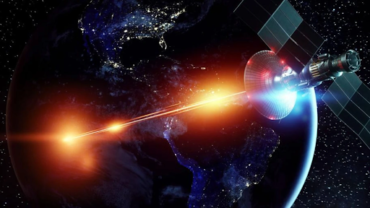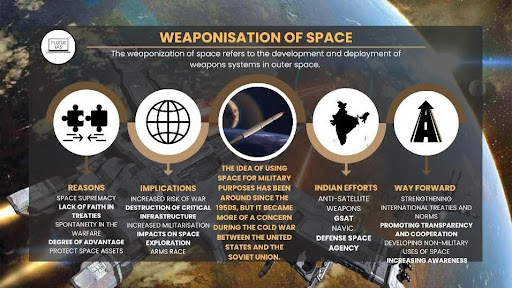Once deemed a place of exploration and discovery, the final frontier has quickly morphed into a military and geopolitical domain in recent decades. The militarization and weaponization of space have become crucial issues that are sparking dialogue and worries all around the planet. There are significant ramifications for international relations, world security, and space exploration going forward from this shift in emphasis from space exploration to possible conflict zones above Earth’s atmosphere.
Space became a vital realm for reconnaissance, communication, and intelligence-gathering as a result of the Cold War-era space race between the United States and the Soviet Union. Satellites were first used for benign purposes, but they quickly found military applications, such as surveillance, navigation, and early warning systems.

The deployment of offensive capabilities is the cause of conventional militarization to weaponization of space. This comprises anti-satellite weapons (ASATs), kinetic kill vehicles, directed energy weapons, and other satellite-disabling or -destroying technology. The capacity to damage or destroy an adversary’s satellite systems can have a significant impact on communication, navigation, intelligence, and even civilian infrastructure, potentially turning space into a battleground.
Through the “Outreach programs initiatives, Kalpana Chawla Debate Competition” developed by Space Technology & Education Pvt. Ltd. (STEPL), educators at Space India invite children to share their opinions on the militarization and weaponization of space. This also included providing the students with brainstorming questions to respond to. This subject made them aware of the gravity of the situation and the potential consequences of breaking the accords. Our outreach teams organize the student participation in these events, and the educators overseeing them ensure their success.
The existence of armaments in space intensifies international hostilities and raises questions about the possibility of an arms race outside Earth’s atmosphere. The susceptibility of space infrastructure to cyberattacks prompts concerns about the safety of vital systems highly relied upon by contemporary societies.

The use of WMDs in space is forbidden by the current legal framework, which is mainly the Outer Space Treaty of 1967. It does not, however, contain any particular laws pertaining to conventional firearms. Debates about the preservation of space for peaceful exploration and scientific growth are also brought up by the ethical ramifications of militarization and weaponization of space. There are other treaties also involved to prevent the weaponization of space as the Moon Treaty, Limited Test Ban Treaty, Prevention of an Arms Race in Outer Space (PAROS), and Prevention of Placement of Weapons in Outer Space Treaty (PPTW).
It is vital to protect space as a haven for research, exploration, and peaceful collaboration. International cooperation in space exploration has sparked advancement and innovation. It is still extremely difficult to strike a balance between the goals of national security and the welfare of all people.
The international community needs to have discussions and come to accords that control the militarization and weaponization of space. The major goal of cooperative efforts should be to create agreements, guidelines, and procedures that stop this common realm from becoming weaponized.
Space is becoming more militarized and weaponized, which creates complicated issues that call for cautious policymaking, ethical thinking, and international cooperation. To ensure that space stays a region of progress rather than conflict, the course of humankind’s space flight must put peace, exploration, and the common good of all nations first. We cannot preserve space for future generations unless we work together thoughtfully and responsibly.
The greatest space programs accessible for studying astronomy and space science are of our company Space India. Our enthusiasm for promoting these kinds of activities encourages students to reflect on their own lives, pick up new skills, and place a high value on space education.
The way the world approaches space will influence not just our security environment but also the opportunities for peaceful exploration and scientific progress in the boundless void above, as we navigate the complexity of this historic moment.
—
If you like the blog, enroll your school or yourself (k-12 student) in our School Programs or Online Programs, call us at +91-74020 74020 or write to us for any query: getintouch@space-india.com


